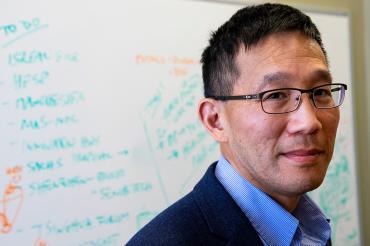Christopher Yip to become new dean of U of T’s Faculty of Applied Science & Engineering

Published: March 28, 2019
Christopher Yip plans to draw on his extensive experience supporting research and academic relationships – both at the University of Toronto and beyond – in his new role as dean of the university’s Faculty of Applied Science & Engineering.
Yip, who currently serves as U of T’s associate vice-president of international partnerships, will serve a five-year term that begins July 1.
"I'm really looking forward to the opportunity to lead the faculty,” said Yip, who is a professor in the departments of chemical engineering and biomedical engineering with cross-appointments to biochemistry and the Donnelly Centre for Cellular and Biomolecular Research.
“It's a tremendous, world-class unit that's so vibrant, energetic, flexible and adaptive – it’s leading in so many different areas.”
Yip previously served as director of the Institute of Biomaterials and Biomedical Engineering, or IBBME, an interdisciplinary hub that connects engineering, medicine and dentistry. There, he oversaw a number of initiatives, including the launch of a new biomedical engineering minor for undergraduates, a new biomedical engineering master’s degree, the creation of a new design studio and an expanded teaching lab.
Under Yip’s watch, IBBME helped lead two major collaborative projects: the Ted Rogers Centre for Heart Research’s Translational Biology and Engineering program and Medicine by Design.
“Professor Christopher Yip’s service to U of T, both as director of IBBME and associate vice-president of international partnerships, has been exemplary,” said Cheryl Regehr, the university’s vice-president and provost.
“His leadership, vision and dedication to academic collaboration and innovation will be key to the Faculty of Applied Science & Engineering’s future success.”
Yip will replace Cristina Amon, who has been dean of the Faculty of Applied Science & Engineering since 2006. Amon was the faculty’s longest serving dean in the past half century and the first-ever woman to hold the position. Under her leadership, the faculty became a global hub for interdisciplinary research and education and set a new standard when it comes to diversity, with women making up 40 per cent of undergraduate enrolment in 2018 for the third year in a row.
As for Yip, he received his bachelor’s degree in applied science from U of T and his PhD in chemical engineering from the University of Minnesota. His research, in the field of molecular imaging, is focused on understanding how molecules and proteins assemble themselves to create functional structures.
He said his time at IBBME provided him with key insights into how researchers from different fields can work together.
“You learn how to drive interdisciplinary relationships,” he said. “You learn how to make things work in different [research] cultures."
That education continued when he arrived at Simcoe Hall. But there was one important difference: Yip was now able to observe how all of the university’s constituent parts fit together – not to mention how U of T connected with outside institutions.
As associate vice-president of international partnerships, Yip helped create new awards and funding opportunities for PhD students and partnered with MaRS Innovation and Toronto Global to facilitate international research partnerships, attract corporate investment and build entrepreneurial initiatives.
Yip also helped launch the Toronto-Tsinghua Entrepreneurship and Innovation Forum and helped strengthen links with key academic partners, including University College London, the University of Manchester, Zhejiang University, the Hong Kong University of Science and Technology, the National Centre for Scientific Research and the National University of Singapore.
Now, Yip said, his goal will be to apply everything he’s learned to his new role at the Faculty of Applied Science & Engineering, where he hopes to increase international visibility and opportunities for faculty and students.
He added that, in some ways, the job of dean resembles what he’s trying to accomplish in his research.
"The tools that I'm using at a molecular scale are very similar to what you need to get people to interact – and to get them to work together as functional units,” he said. "I like to help build, facilitate and encourage people to do things.
“Other people's success is really what drives me."



